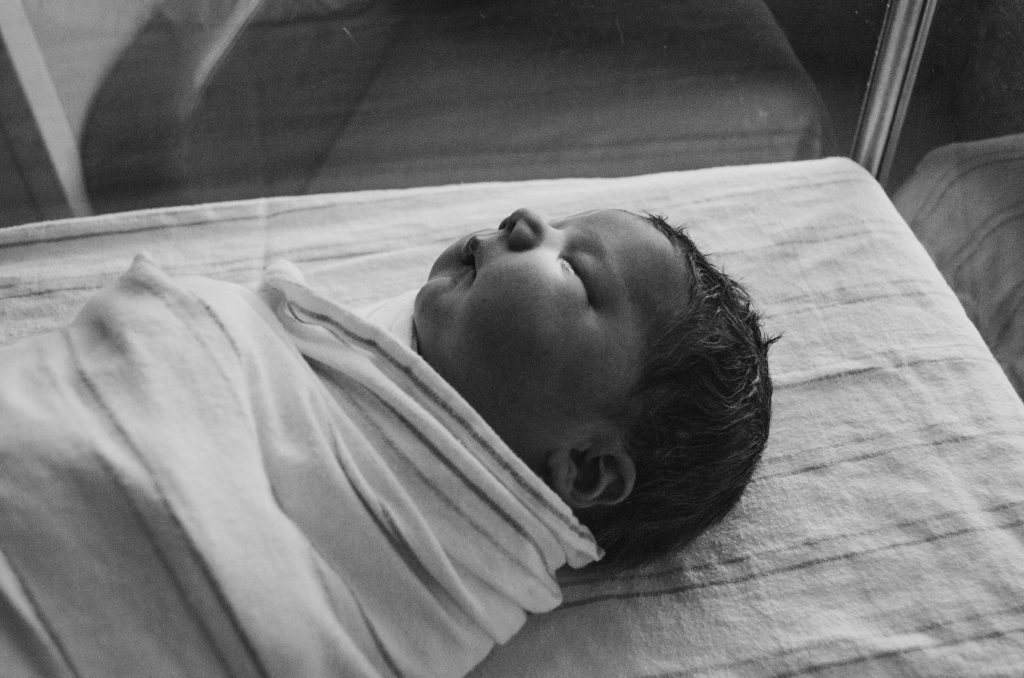
Getting a good night’s sleep is essential for everyone, but it’s especially important for babies. A baby’s sleep patterns are not yet fully developed, so they need all the help they can get to get a long stretch of quality sleep. Are you a mom struggling to get her baby to sleep through the night? Do you wish your baby could sleep for longer stretches? You’re not alone.
Many new parents struggle with getting their little ones to sleep through the night. But don’t worry; there are some things you can do to help your baby sleeps longer stretches. Here are 10 tips that have helped other moms and dads get their little ones to slumber soundly. Try some or all of them, and see if they work for your family:
But First, Why Is Your Baby Not Sleeping Through the Night?

If your baby isn’t sleeping as long as you’d like, it’s important to understand that there are several factors that can contribute to this. Here are a few of the common causes:
1. Your Baby is Developmentally Unable to Sleep for Long Stretches at Night.
During the first few months of life, it’s normal for babies to wake up frequently throughout the night. That’s because their stomachs are small, and they must eat often. Additionally, their brains are rapidly developing, and they may need to transition from one sleep cycle to another several times during the night. For some babies, this developmental process can take up to six months. So if your baby is less than six months old, it’s likely that he or she is not developmentally able to sleep for long stretches at night.
2. Your Baby is Sick or in Pain or may Feel Hunger:
If your baby is sick or teething, he or she may have difficulty sleeping through the night. If you suspect your child is ill, it’s always best to consult your pediatrician. And if teething is the culprit, there are a number of over-the-counter medications that can help ease your child’s discomfort and allow him or her to sleep more soundly (just be sure to follow the dosing directions carefully). Hunger is also a common factor in baby sleep issues, so feed your baby regularly.
3. Your Baby Has Separation Anxiety.
Separation anxiety typically starts around 6 months and peaks around 18 months. During this phase, your child may experience significant anxiety when he or she is away from you (or someone he or she is attached to). This can make it difficult for your child to fall asleep—and stay asleep—when he or she is sleeping in his or her own bed.
So, these are some of the common factors that can contribute to baby sleep issues. Now, let’s look at some tips you can use to help your baby sleep better and longer.
10 Baby Sleep Tips That’ll Help Baby Sleep Longer Stretches

It’s 2 am, and you’re awake. Again. You lie in bed, bleary-eyed and exhausted, trying to will yourself back to sleep. But it’s no use. Your mind races as you think about everything you have to do tomorrow and how little sleep you will get tonight. You glance over at your baby’s crib, where she’s peacefully snoozing away, and you can’t help but feel a twinge of envy. Why can’t you sleep like that?
Most babies don’t sleep through the night until they’re 6 months or older. And even then, it’s not uncommon for them to wake up once or twice a night. So if your baby is still waking up regularly during the night, there’s no need to worry—it’s completely normal!
That said, there are a few things you can do to encourage longer stretches of nighttime sleep:
1. Swaddle:

Most babies experience the startle reflex during the first four to five months. This is when they feel like they are falling, and it causes jerking movements, which incidentally wakes them up. Swaddling a baby tightly prevents them from startling themselves awake and can help them sleep both better and longer.
There are a few different methods you can use to swaddle your baby. One popular way is to use a receiving blanket about four feet square. Another option is to purchase a swaddling blanket specifically designed for this purpose. Regardless of the type of blanket you choose, ensure that it is big enough to wrap around your baby completely with some extra fabric left over. It’s crucial to ensure the baby can’t wiggle out of the swaddle.
2. Dreamfeed:

A dreamfeed is a feeding given to an infant while they are sleeping. The feeding is meant to reduce the risk of overnight waking and improve sleep quality for the infant and their caregiver. Dreamfeeding can be practiced from birth, though it is most commonly started when an infant is around six weeks old. To perform a dreamfeed, the caregiver will gently wake the sleeping infant and offer them a bottle or breastfeed them. After the baby has been fed, they are put back to sleep in their crib.
Dreamfeeding can be an effective way to get babies to sleep for longer stretches. However, it is important to speak with your baby’s pediatrician before starting this technique to ensure that your baby is getting enough nutrition at the correct times.
So generally, getting a 3-4 hour newborn sleep during the night from birth to 6 weeks is pretty good! You should be able to get 4-6 hours of sleep between 6-12 weeks. Dream feeds can last up to eight or nine hours for some babies. When most authors tout “getting baby to sleep through the night”, they refer to a 6-hour stretch of sleep. As a newborn baby has a very small stomach, usually feed him/her at least 2.5 hours during the day, cluster feed him/her in the evening, and dreamfeed at night. The more calories you’re able to feed during the day, the less they may need at night.
3. Use White Noise:

One of the best baby sleep tips is to use white noise. White noise is any sound that masks other sounds. This can be anything from a fan to environmental sounds like rain or waves. White noise helps babies fall asleep because it prevents them from being disturbed by outside noise.
You can use white noise with your baby in a few different ways. There are white noise machines specifically designed for infants, or you can download an app with white noise sounds on your phone. You can also play a song on a loop or put it on a podcast. Experiment with different sounds until you find one your baby likes, and helps them sleep through the night.
4. Establish an Earlier Bedtime Routine:
Another helpful baby sleep tip is to establish an earlier bedtime routine. You want to get babies ready for sleep before they become over-tired or overtired, as this makes it harder for babies to fall asleep and stay asleep. An easy way to do this is to start the bedtime routine at least an hour before the baby’s bedtime. This should include a bath, quiet play time, a baby massage, and feeding. Doing this every night will help babies become familiar with their bedtime routine and make it easier for them to fall asleep.
5. Creating a Sleep-Friendly Environment:
To help a sleeping baby stretch longer, it is important to create a sleep-friendly environment. This means ensuring your baby’s bedroom is dark and quiet and at a comfortable temperature. You can also use blackout blinds or curtains to block out any light from entering the room. It’s also helpful to limit stimulation before bedtime by avoiding screens, loud noises, and bright lights.
6. Lie Your Baby Down Awake, But Drowsy.
One of the best ways to help your baby learn to self-soothe and fall asleep on their own is to lay them down when they are still awake but drowsy. This way, they can learn to drift off to sleep independently without needing your help. Try to stick with this routine as much as possible and avoid picking the baby up when crying, as this can create a dependency on you for sleep.
7. Make Diaper Changes Strategically:
If you know your baby will sleep for a longer stretch at night, make sure you change their diaper before they go to bed. This will help ensure they’re comfortable and won’t wake up in the middle of the night needing a fresh diaper. But if your baby wakes up in the middle of the night, quickly change their diaper and place them back in bed while they are still sleepy to help them get back to sleep quickly.
8. Follow the Babies Sleep, Wake, And Eat Cycle:
Following the wake, sleep, and eat cycle is a baby sleep tip that can help the baby settle into a healthy sleep schedule. This means ensuring the baby is awake for a certain amount of time before naps and bedtime, regularly eating throughout the day, and following consistent nap times. The more you stick to this routine; the better baby will sleep.
9. Limit the Length of Naps:

Finally, limiting the length of the baby’s naps during the day can help the baby sleep longer stretches at night. This is because babies won’t feel as rested if they sleep for long periods during the day and will be more likely to wake up in the middle of the night. Aim to keep baby’s naps to about an hour each and no longer than two hours if possible. This is an excellent baby sleep tip for helping babies get the rest they need at night.
10. Get Moving:

Getting the baby moving during the day can also help the baby sleep better. Aim to get baby up and moving several times a day with baby-safe activities like tummy time, stroller walks, or playing at the park. This will help the baby fall asleep more easily and sleep longer stretches throughout the night.
Final Verdict – Baby Fall Asleep Tips
These baby sleeping tips will help babies sleep longer stretches and give you a much-needed break. Remember that baby’s sleep patterns will change over time, so don’t get discouraged if the baby isn’t sleeping through the night right away! With patience and consistency, the baby will soon settle into a healthy sleep pattern. And be sure to spend some time on sleep training or newborn sleep tips to ensure the baby gets the sleep he or she needs. Good luck!
Frequently Asked Questions:
Q: Why Is It Important For a Baby To Sleep Through The Night?
It’s important for babies to sleep through the night so that they can get the rest they need to grow and develop properly. Additionally, sleeping through the night will help improve mom and dad’s sleep quality.
Q: How Long Do Babies Usually Sleep?
Most babies will sleep for about 15-18 hours in a 24-hour period, with shorter naps throughout the day and longer stretches at night. As the baby grows older, this may change slightly so that baby is sleeping less during the day and more at night. It’s important to create a consistent sleep schedule to ensure the baby is getting the rest he or she needs. Following baby sleep tips can also help the baby settle into a healthy sleep routine.
Q: What Time Should I Put My Baby To Bed To Falling Asleep?
Ideally, the baby should be in bed by 8 PM. This will give babies enough time to wind down and fall asleep and get the rest they need throughout the night. A consistent bedtime routine can also help the baby settle into a healthy sleep schedule.
Q: Do Babies Need Special Mattresses?
Yes, babies do need special mattresses specifically designed for them. This is because babies are delicate and need the right type of mattress to provide sufficient support. Additionally, baby mattresses are usually made with hypoallergenic materials to help protect babies from allergens while they sleep.
Baby Sleep Hack:
A great free YouTube video that helped me through putting my babies to sleep journey is:
It works like magic! Sweet dreams to your baby!




